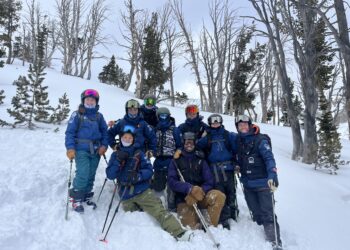By Jayme Fraser The Missoulian
MISSOULA (AP) – When Leon Billings was first asked to join a Congressional subcommittee on pollution, he was not interested.
“To me, I thought being polluted was having too much alcohol,” the Helena native routinely quips to admit that he had known little about the topic which would come to define his career as he helped create bedrock environmental-protection laws. “Sewage engineers talked about this. This wasn’t part of a public discussion other than as a localized issue. There certainly wasn’t a public consciousness.”
Billings was persuaded to leave his lobbying job in 1966 to become staff director of the Senate Subcommittee on Environmental Pollution, the Missoulian reported. The influence of the then-minor subset of the Committee on Environment and Public Works would grow with the leadership of Sen. Edmund Muskie of Maine, who later made two runs for the White House before serving as U.S. Secretary of State. At the direction of Muskie, Billings negotiated and wrote two landmark pieces of legislation: the Clean Air Act of 1970 and Clean Water Act of 1972.
In a wide-ranging interview, Billings, 78, discussed growing up in Montana and his role in creating the first nationwide pollution standards.
Leon’s parents, Harry and Gretchen Billings, are legendary in Helena history.
The couple ran the People’s Voice newspaper through the ‘40s, ‘50s and ‘60s. The liberal weekly, derided by conservatives as “The Pink Reporter,” was funded by a cooperative of unions and progressive leaders such as Lee Metcalf and James Murray.
“They were early fighters for justice in just about every aspect you could think of in Montana,” said Dennis Swibold, a University of Montana School of Journalism professor and newspaper historian. “A lot of people that grew up in progressive Montana got their start reading Harry and Gretchen.”
Former U.S. Rep. Pat Williams was one of them. When he was a sixth-grade teacher in Butte considering a career in politics, Williams said he drove to Helena twice a week to talk with the Billingses at their small office across the street from the capitol. He called them “among the most important Montana progressives in my lifetime.”
Leon Billings, who was the same age as Williams, also developed an interest in politics because of his parents and their visitors.
“My folks had one rule,” he said. “Anybody’s welcome at the house as long as they bring their own bottle of whiskey. They’d sit around and talk all night.”
Anne Cantrell, who wrote her 2006 master’s thesis at the University of Montana about Harry and Gretchen Billings, said they were ahead of their time, particularly on topics that broadened conservation beyond public land and wildlife issues to link environmental and human health.
“While the Anaconda Copper Mining Company-controlled papers – known as the Copper Press – suppressed environmental reports, the People’s Voice worked to make environmental issues public,” Cantrell wrote. “Over the years, Harry and Gretchen reported and editorialized about a variety of environmental issues, including the dangers associated with building an aluminum plant in the Flathead Valley, the need for air pollution controls and the protection of water.”
For instance, she noted that a 1958 article about waste discharge from a pulp mill killing fish in the Clark Fork River near Missoula was published “12 years before the first Earth Day and the beginning of a national environmental movement, and 14 years before the state Constitution’s guarantee to the right of a clean and healthful environment.”
“Harry and Gretchen were just a touch out in front of the next progressive movement,” Williams agreed. “They were writing about things and pushing for them just before, just prior to Montana taking on an issue. Sometimes they caused it. I don’t know that was their purpose. I think they were trying to get people to think big.”
But their aggressive idealism ultimately led to the failure of the newspaper in 1969. The Billingses staunchly opposed the Vietnam War, which angered some of their remaining funders.
“The reason it dried up financially,” Williams said, laughter interrupting his recollection of the couple’s fierce independence, “was the paper finally angered virtually every interest in Montana, including their good friends at organized labor. The People’s Voice just didn’t pull any punches.”
Neither did Leon Billings.
When Muskie later suggested Billings as a candidate to lead the fledgling Environmental Protection Agency, President Jimmy Carter called the senator to discuss his concerns.
“‘Abrasive?’” Billings recalled Muskie saying into the phone. “‘Abrasive, Mr. President? You’ve never met Leon Billings. You have no idea how abrasive he is.’”
Billings admits to being “a mouthy kid,” the youngest of three boys. He has said he started to hone a reflex for cutting quips while he was dropping off copies of his parents’ newspaper to offices in the state capitol, where his deliveries – particularly to the Department of Agriculture – were not always welcomed. He recalled being kicked out of history class at Helena High School “eight or nine times junior year because I argued with the teacher who had very strong, very conservative views.” The Billings boys were called “commies” and attacked, sometimes physically, by peers.
At the time of Leon’s brother Harry Billings’ death in 1990, the Helena Independent Record quoted him as once saying, “I kept a wrench on my desk in case the (American) Legion boys came galloping in, which they did one time.”
“Obviously, Leon grew up in a very hostile world, to say the least, with a very radical mom and dad,” Montana Historical Society spokesman Tom Cook said.
“It was an education growing up a Billings,” Leon Billings said.
Yet his role in crafting the Clean Air Act and other bipartisan compromises reflected a give-and-take political strategy at odds with his parents’ often all-or-nothing approach.
“There was a general philosophy among liberals back in the day that half a loaf wasn’t good enough,” he said. “And I learned that if you get it right you could get three-quarters to seven-eighths of a loaf, but never the whole loaf … I had a mentor in Ed Muskie who taught me to get a result that’s acceptable without just having a fight where you won’t get anything at all.”
Pollution surged to the forefront of public discussion in the late 1960s as evidence of environmental degradation confronted Americans and a generation of progressive activists found a new cause. Rivers caught fire. Beaches were closed. Bad air days caused deaths. Sen. Gaylord Nelson, D-Wisconsin, organized the first Earth Day on April 22, 1970, drawing millions to hear speeches about the importance of the environment.
In this climate, the first nationwide air pollution standards were crafted with Billings, typewriter at the ready. Provision by provision, negotiated behind closed doors – as was legal then – with Democrats and Republicans.
Muskie’s focus was protecting public health by infusing environmental controls with scientific rigor yet leaving room for them to adapt as research yielded new findings. Sen. Howard Baker, R-Tennessee, who would later serve as Chief of Staff to President Ronald Reagan, believed technologies that could cut emissions from cars might have to be forced to development by permitting renewals. Sen. Philip Hart, D-Michigan, sought a mechanism for the general public to force regulators or polluters to comply with the law, creating the citizen suit provision that brought environmental advocates to a negotiating table once effectively limited to lobbyists and bureaucrats.
Carpooling between their homes and the U.S. Capitol each day in a pickup truck, Billings and minority staff director Tom Jorling hammered out compromises and refined pitches they’d make to their respective parties.
Among the most pivotal changes to the Clean Air Act was substituting a single word, Billings said. Every instance of “may” was replaced with “shall,” shifting the statute from something administrators and elected executives might do when it suited their political purposes to something that they must do.
President Richard Nixon also had tasked Republicans to update the Clean Air Act of 1963, although to a lesser degree, as part of a strategy to usurp the issue from Democrats in future campaigns. The version written by Billings and which passed the Senate in a unanimous vote nearly died in the House, then again in conference committee. Narrowly avoiding a deadline, the Clean Air Act of 1970 was finally approved late on Dec. 31.
“It was 38 pages long and is probably the most radical statute ever enacted,” Billings said. “We were in a full-scale war between protecting public health and welfare from environmental degradation and the profit motives of corporate America.”
Although environmentalists praise the landmark legislation he helped craft, some are hesitant to label Billings a champion. Jim Jensen, director of the Montana Environmental Information Center, noted that Billings later worked as a lobbyist and consultant for W.R. Grace, owners of the Libby vermiculite mine that contaminated the town with asbestos, causing hundreds of deaths.
Billings said the work he did for Grace was at the request of a former Capitol Hill colleague who was hired by the company just as the Seattle Post-Intelligencer revealed that the company failed to disclose health threats to employees. He said he helped set up an initial meeting for the company with Sen. Max Baucus and gave advice on setting up health programs for employees and other measures.
Billings said his work for Grace was less involved than what he did for other companies who hired him to help navigate the politics of setting up trust funds for victims or negotiating remediation efforts after being called out for major pollution.
“Because of my background on environmental legislation, by the time people came to me, they were in such desperate shape politically,” Billings said. “They wanted to know how to quickly resolve it after sometimes stonewalling and denying the issues for years.”
Most other environmental advocates point to his ongoing efforts to protect anti-pollution laws. Billings says he sees many of the same interests and arguments at play today as during the drafting of the federal statues, where the Clean Power Plan, Waters of the U.S., and the fate of the Environmental Protection Agency itself are dragged into campaign stump speeches and challenged in courtrooms.
Williams explains Billings’ lifelong pursuit of environmental protections in two ways.
“Leon, having breathed clean air before he left Montana to go to Washington D.C., knew the difference between that air and this air,” Williams said. “He also grew up with a mom and dad who talked politics and policy all the time. Caring about an issue was not a shirt he had to put on in the morning. It was part of his skin because of Gretchen and Harry.”
Copyright 2016 Associated Press. All rights reserved. This material may not be published, broadcast, rewritten, or redistributed.













